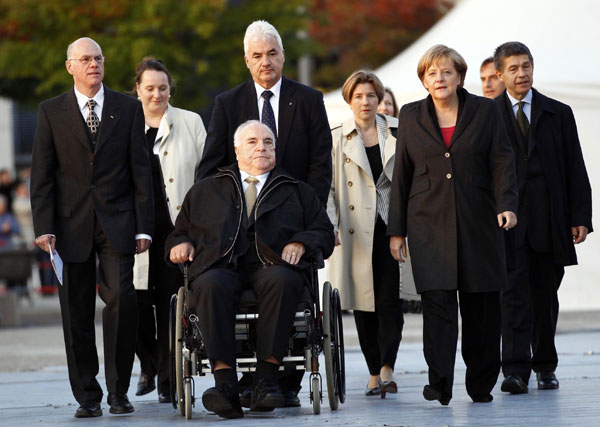Global General
Germany celebrates 20 years of reunification
(Xinhua)
Updated: 2010-10-04 08:50
 |
Large Medium Small |
Germany was officially reunited from the midnight of October 3, 1990, 11 months after the fall of the Berlin Wall, a symbol of the country's four-decade division after the World War II -- the Federal Republic of Germany in the west and the German Democratic Republic in the east.
In the beginning of the ceremony, guests were surprised at hearing greetings from outer space. US astronaut Doug Wheelock and his colleagues sent best wishes to Germany from the International Space Station (ISS), the largest internationally- developed artificial satellite that has ever orbited the Earth.
Congratulations also came from US President Barack Obama and his Russian counterpart Dmitry Medvedev, whose country represented two victorious powers and divided the defeated Germany into four parts with Britain and France in 1940s.
Wulff delivered his first major speech since taking office in June during the ceremony, which was eagerly awaited by the public and media.
He told East Germans: "You have done it, with an incredible willingness to change," adding that "it was East Germans who shouldered the vast majority of changes so that our country could be united again ... This has not been appreciated sufficiently."
The president then changed his focus on "what does a united Germany means today" and shared his thoughts on a recently disputed topic -- immigration and integration, an issue triggered by German Central Bank board member Thilo Sarrazin's disparaging remarks on Muslim and Jewish immigrants. Wulff said earlier that he viewed as integration of the society as "a priority" in his term.
"Twenty years after unification, we are facing a huge task of finding new cohesion in Germany in the rapidly changing world," he said. "We are one people! This slogan of the unification must now be an invitation to all who live here."
"Christianity without a doubt belongs in Germany. Judaism without a doubt belongs in Germany. This is our Judeo-Christian history," he said. "And by now, Islam also belongs in Germany."
We cannot allow the making of myths, the hardening of prejudice and exclusion," he said. "To value diversity, close rifts in our society can create real solidarity."
Wulff concluded that "the idea is to make this country a home -- for everyone. This land is our common country, whether from East or West, North or South, and no matter what their origins are."
Before the ceremony, Merkel said in a video podcast that she appreciated the joint efforts made by both the East and the West that help "rebuild (the country) so quickly and make Germany a respected country in the world."
In central Berlin, large-scale entertainment programs were ready in front of Brandenburg Gate, a symbolic building of the city and a key "witness" of the Berlin Wall's falling in 1989. The main streets and square near the Gate has opened to Berliners to have a night party.
Like in past years, thousands of left-wing activists demonstrated before the anniversary, mostly in Bremen this year, in a peaceful way, to show their opposition to the unification. Police said they have strengthened the security in major cities like Bremen and Berlin, and some 3,000 officers were deployed in the celebration site of Bremen.
Controversies on the way of unification do not only reflect in deeds, but also in minds. Some politic experts said out-dated conceptions still run deep after 2o years of unification, as many Easters believed they were viewed as second-class citizens and saw Westerners as "arrogant." Moreover, some West Germans often criticized the East ones as lazy and ungrateful.
